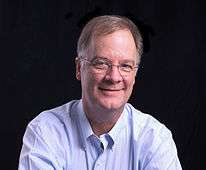Richard M. Myers
| Richard M. Myers | |
|---|---|
 | |
| Born |
March 24, 1954 Selma, Alabama |
| Residence | Huntsville, Alabama |
| Citizenship | United States |
| Nationality | United States |
| Fields | Genetics |
| Institutions | HudsonAlpha Institute for Biotechnology |
| Alma mater |
University of Alabama (BS in Biochemistry) University of California at Berkeley (PhD in biochemistry) |
Richard M. Myers (born March 24, 1954) is an American geneticist and biochemist. He is President and Science Director of the HudsonAlpha Institute for Biotechnology.[1] He was previously the chair of the department of genetics at Stanford University and director of the Stanford Human Genome Center.[2][3]
Myers' genome center contributed approximately 10 percent of the data in the Human Genome Project's efforts to sequence the human genome.[4] His research focuses on human genetics and genomics and their interaction with inherited diseases.
Early life and education
A native of Tuscaloosa, Alabama, Myers attended college at the University of Alabama where he earned his bachelor's degree in biochemistry. He later went on to earn his Ph.D. in biochemistry from the University of California at Berkeley. Myers continued his work in California when he joined the faculty of the University of California at San Francisco and moved on to the Stanford University School of Medicine.
Human Genome Project
During his time at Stanford, Myers was professor and chair of the Department of Genetics and director of the Stanford Human Genome Center, one of the first U.S. human genome centers. Myers led the center to contribute more than 10 percent of the data in the Human Genome Project.
HudsonAlpha and the Myers Lab
Biotech visionaries James R. Hudson, Jr. and Lonnie S. McMillian founded HudsonAlpha in 2008. Former Governor of Alabama Bob Riley, announced in 2007 that Myers would lead the institute as president and science director.[5]
The Myers lab is composed of students, postdocs, technicians and senior scientists who are interested in how variation in our genomes contribute to human traits and disease. The lab measures this variation by developing and applying very high-throughput sequencing and analysis technologies. Current projects include pancreatic cancer, breast cancer, ENCODE, neurological disorders and nuclear receptors in gene regulation.
Honors and Awards
- 1975: Phi Beta Kappa, University of Alabama
- 1977-1978: Abraham Rosenberg and Kaiser Fellowships, UC Berkeley
- 1979-1980: Regents Fellowship, UC Berkeley
- 1980-1981: Honors Students’ Society, UC Berkeley
- 1982-1984: Damon Runyon-Walter Winchell Cancer Fund Fellowship, UC Berkeley
- 1984-1985: Leukemia Society of America Senior Postdoctoral Fellowship, Harvard
- 1988: Basil O’Connor Starter Scholar Research Award, UCSF
- 1987-1990: Searle Scholar, UCSF
- 1986-2003: Wills Foundation Award, UCSF/Stanford
- 2002: Darden Lecture Award, University of Alabama
- 2002: Pritzker Foundation Award, University of Washington
- 2003: Blount Initiative Award, University of Alabama
- 2005: Honorary Doctorate in Humane Letters, University of Alabama
- 2009: Leadership Alabama Inductee, Class 20
- 2011: AAAS Fellow, American Association for the Advancement of Science
References
- ↑ http://hudsonalpha.org/about-us/leadership/executive-team. Missing or empty
|title=(help); External link in|website=(help); - ↑ "Richard Myers, director of Hudson-Alpha Institute for Biotechnology, Huntsville, Alabama".
- ↑ "Head of Stanford Human Genome Center to Lead HudsonAlpha".
- ↑ "Stanford researchers make major contribution to human genome sequence".
- ↑ "Riley Announces Scientific Director for HudsonAlpha Institute". http://www.sos.alabama.gov/PR/PR.aspx?ID=73. Alabama Secretary of State. External link in
|website=(help);